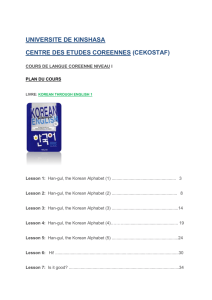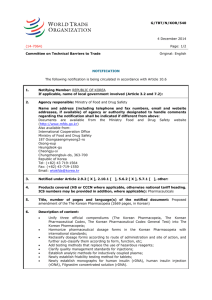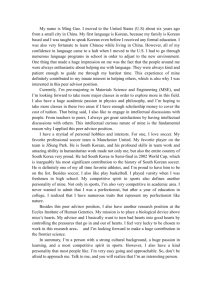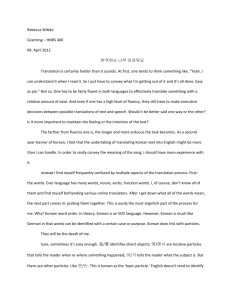S - The Korean Language Flagship Center
advertisement
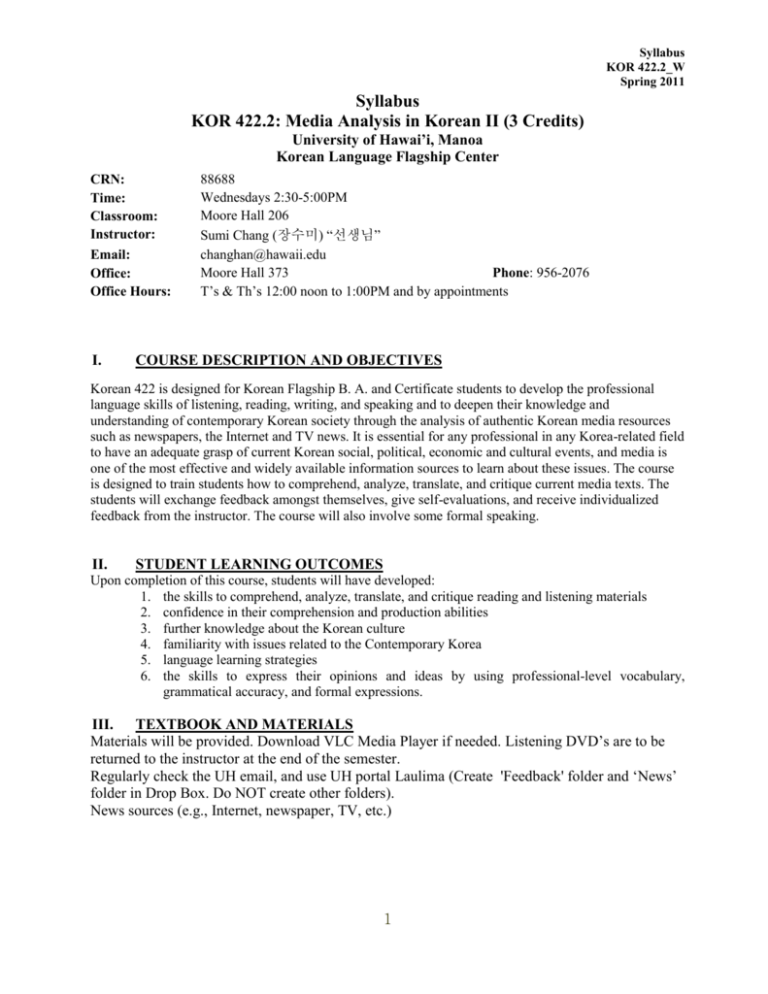
Syllabus KOR 422.2_W Spring 2011 Syllabus KOR 422.2: Media Analysis in Korean II (3 Credits) University of Hawai’i, Manoa Korean Language Flagship Center CRN: Time: Classroom: Instructor: Email: Office: Office Hours: I. 88688 Wednesdays 2:30-5:00PM Moore Hall 206 Sumi Chang (장수미) “선생님” changhan@hawaii.edu Moore Hall 373 Phone: 956-2076 T’s & Th’s 12:00 noon to 1:00PM and by appointments COURSE DESCRIPTION AND OBJECTIVES Korean 422 is designed for Korean Flagship B. A. and Certificate students to develop the professional language skills of listening, reading, writing, and speaking and to deepen their knowledge and understanding of contemporary Korean society through the analysis of authentic Korean media resources such as newspapers, the Internet and TV news. It is essential for any professional in any Korea-related field to have an adequate grasp of current Korean social, political, economic and cultural events, and media is one of the most effective and widely available information sources to learn about these issues. The course is designed to train students how to comprehend, analyze, translate, and critique current media texts. The students will exchange feedback amongst themselves, give self-evaluations, and receive individualized feedback from the instructor. The course will also involve some formal speaking. II. STUDENT LEARNING OUTCOMES Upon completion of this course, students will have developed: 1. the skills to comprehend, analyze, translate, and critique reading and listening materials 2. confidence in their comprehension and production abilities 3. further knowledge about the Korean culture 4. familiarity with issues related to the Contemporary Korea 5. language learning strategies 6. the skills to express their opinions and ideas by using professional-level vocabulary, grammatical accuracy, and formal expressions. III. TEXTBOOK AND MATERIALS Materials will be provided. Download VLC Media Player if needed. Listening DVD’s are to be returned to the instructor at the end of the semester. Regularly check the UH email, and use UH portal Laulima (Create 'Feedback' folder and ‘News’ folder in Drop Box. Do NOT create other folders). News sources (e.g., Internet, newspaper, TV, etc.) 1 Syllabus KOR 422.2_W Spring 2011 IV. GRADING* The final course grade for KOR 421 will be determined as follows: 1. Attendance & Participation 8.5% 2. News Report (13) 6.5% 3. Assignments (11-1)x4=40+) 40% 4. Discussion Leading 10% 5. Midterm Exam 15% 6. Final Exam 20% Total 100% Grade Distribution: 98-100: A+ 94-97: A 87-89: B+ 84-86: B 77-79: C+ 74-76: C 67-69: D+ 64-66: D 59 or below: F 90-93: A80-83: B70-73: C60-63: D- 1. Attendance & Participation (10%) Attendance is a critical component of the course. If you are late or absent, it is YOUR responsibility to contact the instructor to make up for the missed work. Additionally, active class participation will help improve your language proficiency. An absence will be counted as an absence regardless of the reason, and will be excused only upon the instructor’s discretion for extenuating circumstances with verifiable written document on a case by case basis. Being tardy or leaving early multiple times will add up to absence. (Usually, 3 tardiness or early leaves will equal one absence.) Being late to class or leaving early by twenty minutes or more will constitute an absence. You may still join the class if you are late; however, please remember that tardiness can be disruptive to the class. If you accumulate three (3) or more unexcused absences, you will automatically get an F for the course. (Please note that this policy does NOT translate into automatically passing the course if you have less than three absences.) 2. News Report (5%) At the beginning of each class, each student will share a current news item about or related to Korea. The title, author, and a Korean source should be submitted in Laulima by 8PM the Monday evening before the class day. Please use one of the major Korean newspapers or television stations. News should be recent, preferably be dated within a week, or at least within a month 3. Assignments (40%) Each unit will have a reading rendition and listening summary assignments. The focus of rendition will vary from assignment to assignment (e.g., accuracy, Romanization, fluency, etc.). Reading and listening assignments can be found in Laulima Resources page, and are to be uploaded in Laulima Drop Box when completed. The students will exchange peer feedback. Peer feedback should be emailed to your peer, and uploaded in Laulima in a folder titled 'Feedback'. Please print the peer feedback you give, bring it to class, and give it to the author. Late submission will result in deduction in points. The lowest set of grade will be excluded from the final grade. 4. Discussion Leading (10%) Students will take turns leading class discussion on rendition and summary. 2 Syllabus KOR 422.2_W Spring 2011 5. Mid-term Exam (15%): W, 2/23 in MH 155B (Faculty Development Lab) The mid-term exam will be in a format similar to the reading rendition and listening summary assignments, and will be on the materials already covered in class. 6. Final Exam (20%): W, 4/27 in MH 155B (Faculty Development Lab) The final exam will be in a format similar to the reading rendition and listening summary assignments, and will be on new materials not covered in class or the parts we did not get to cover in class of the materials used in class. V. STUDENT CONDUCT INCLUDING PLAGIARISM Please be familiar with the expected student conduct at UH. It is ultimately each student’s responsibility to understand the rules including plagiarism and academic dishonesty, and to learn how to avoid such violations. At UH, common consequences for such violations include failing the assignment, failing the course, suspension from the university, or even expulsion. For details, go to http://www.studentaffairs.manoa.hawaii.edu/policies/conduct_code/impermissible_behavior.php It is ok to get help from other (native) Korean speakers for your study as long as you include an acknowledgement. However, I need to see YOUR Korean and YOUR progress. For example, it all right to have someone else proof-read your writing, but the original work must be yours. VI. VISITORS AND RECORDING Throughout the course, there may be visitors who come to observe the instructor and the class. Reasons for the visit may include professional development for teaching, research, etc. The instructor will try to announce the visit in advance whenever possible. Also, audio or video recording of the class may take place. If you do not feel comfortable about the recording, please let the instructor know. VII. CLASS RULES 1. Come to class prepared by pre-&reviewing the lesson materials for that day and participate actively! 2. Learn and internalize the given material by using them in and out of the class. Please try to speak in Korean only. I will be talking mostly in Korean to provide you with as much input as possible, too. Do not be discouraged if you do not understand every word. However, if you did not understand something, there is a good chance that other classmates did not either, so do not be shy about asking questions or requesting repetitions. 3. Notice and evaluate your own learning/strategies and take the responsibility of learning. 4. Understand that language learning is a fun and exciting process of acquiring another cultural perspective and system of expression. 5. Understand that second language learning is one of the hardest intellectual challenges, and that challenge can be met only by perseverance. 6. I am always willing to provide extra help. You should take advantage of the office hours. 7. Use of personal laptop and other materials irrelevant to instruction is not allowed. 8. No eating and gum chewing is allowed. 9. Please turn off any devices such cell phone that might disrupt the class. 10. Be respectful of others; treat other the way you want to be treated. VIII. MISCELLANEOUS 1. Korean Culture Activities A culture is an important part of language learning. There will be various cultural activities throughout the year. They are an important part of the culture learning of the course, so please mark your calendar, get involved, and have fun! 2. Letter of Recommendation 3 Syllabus KOR 422.2_W Spring 2011 If you need a letter of recommendation, please ‘ask’ at least three weeks in advance. Even with advance notice, I may not be able to accommodate your request if I am inundated with prior commitments. Providing your resume and statement of purpose, if you have one, will help me in writing the recommendation letter. IX. Assignment Information 1. Time Weekly Assignment Schedule (Wednesday Class) S M T 1:30 Th F - Hard copy of peer feedback to be given to the author before class PM 8:00 - Reading rendition PM - Listening summary Email to your partner, discussion leader, and upload in Laulima. W - Peer Feedback Email to your partner and upload in Laulima. - Current events article Upload in Laulima. 2. File naming for K422: Course_Topic#_HW Type_Topic_initial Example: K422_T1_RFbyJP_History_YL (Korean 422, Topic 1, Feedback given by Jay Park on Reading rendition done by Yumi Lee_History_Yumi Lee) News_SubmissionDate_Initial (or just the link is acceptable) Example: K422_News_0125_YL Abbreviations: C=Correction (revision) Fby initial=Feedback (example: FbyJP = Feedback given by Jay Park) L=Listening (Korean summary of listening) R=Reading (English rendition of Korean reading material) T=Topic File and Email Format: Each file and email should have an appropriate title be in English (Laulima and UH Webmail sometimes cannot read foreign characters). Title order should be as above. For each file, be sure to include the file title in the upper right hand as a header, and page numbers in the center as a footer. This way, the file name and the page number will show on each page. Use 4 Syllabus KOR 422.2_W Spring 2011 Microsoft Word file using Batang (Times New Roman for English) font, size 11, and double space. Reading Rendition: 1. Write a rendition to the Korean reading material into English in detail. Be sure to be accur ate and fluent. Write the English rendition under each Korean paragraph. 2. Submit in Laulima following the submission schedule, and also send it to your assigned pa rtner and the discussion leader. 3. Write a peer feedback using the 'comment/memo' function. Do NOT use the 'track change' function. Submit the peer feedback in Laulim in the 'Feedback' folder, and email it to you r partner. Print the peer feedback and give it to the author by the start of the class. Listening Summary: 1. Write a summary of the listening material in Korean. Try to do this assignment soon after t he class while the material is still fresh in your mind. The length should be 200300 words (not syllables). 2. Follow the same steps as 2 and 3 under Reading Rendition. Correction Assignment: Occasionally, you will be asked to revise the assignment(s) and submit. When making revisions, do not delete the original writing, but add the revisions using the 'track change' or 'comment/memo' function, underline, or brackets/parentheses. It is recommended that you revise every assignment. X. FEEDBACK SYMBOLS Sources: Clark, R. C., Moran, P. R., & Burrows, A. A. (1981). The ESL miscellany: a cultural and linguistic inventory of American English. Battleborrow, VT: Pro Lingua Associates. Krenzke, L., Kemper, D., & Sebranek, P. (1996). Writers INC. Boston: Houghton Mifflin. Sohn, H. (1999). The Korean language. Cambridge, UK: Cambridge University. 1. 전반적인 피드백 1. 2. 3. 4. 약자 C D G SP or underline 뜻 content discourse grammar spelling 5 Syllabus KOR 422.2_W Spring 2011 2. 구체적인 피드백 약자 5. awk. 6. cap. 7. caus. 8. col. 9. con. 10. conjug. 11. cons. 12. cvcv 13. details 14. d. m. 15. for. 16. frag. 17. i. c. 18. incho. 19. inf. 20. lit. 21. m. 22. moc 23. mow 24. n. c. 25. p. 26. passive 27. part 28. plr 29. pps 30. punc. 31. red. 32. r. o. 33. roman. 34. s/e 35. s/d 36. s/o 37. s/v 38. spc. 39. t. 40. t/a 41. t/m 42. trans. 43. w. c. 44. w. o. 45. wordy 뜻 awkward expression capitalization use causative suffix incorrect collocation use connecting word/phrase incorrect (verb) conjugation consistency constant-vowel rule add details discourse marker inappropriate formality level fragment incorrect meaning inchoative too informal literal translation meaning is slightly off missing or omitted content missing or omitted word not clear particle incorrect use of passive incorrect part of speech plural/singular preposition (post-position) punctuation redundant run-on sentence romanization sentence ending subject deletion reversed subject and object subject-verb agreement spacing incorrect verb tense incorrect verb tense-aspect (verb in progress or not) incorrect verb tense-mode (intention/probability in verb) transitive/intransitive word choice word/phrase order too wordy, be concise 6 Syllabus KOR 422.2_W Spring 2011 Peer Feedback 일정표 1. Chun, Clarice claricec@hawaii.edu 2. Kang, Peggy C. pkang@hawaii.edu 3. Lee, Jeannie leejeann@hawaii.edu 4. Lim, Danica yiseul@hawaii.edu 5. Nam, Rachel H. rnam@hawaii.edu 6. Yi, Sujan sujan@hawaii.edu 보내는 학생 (sender) 주 1. 2. 3. 4. 5. 6. 7. 8. 9. 10. 제출과제 12. 13. 14. 15. 발표자 수업일 1 2 3 4 5 6 (수) 수업내용 Introduction: SL Learning Strategy R11 1/16 L11 & R12 1/23 L12 & R13 1/30 L13 & R14 2/6 L14 & R15 2/13 L15 2/20 R16 2/27 L16 & R17 L17 & R18 봄 방학 11. 과제 제출일 (일) 선영 이슬 수잔 Midterm 패기 1/19 2 1 4 3 6 5 1/26 2 1 4 3 6 5 2/2 2 1 4 3 6 5 2/9 3 6 1 5 4 2 2/16 3 6 1 5 4 2 2/23 중간시험 3/2 4 5 6 1 2 3 3/6 3/9 4 5 6 1 2 3 3/13 3/16 5 3 2 6 1 4 ☻ L18 & R19 3/27 L19 & R20 4/3 L20 & R21 4/10 L21 4/17 (3/ 23) 진희 3/30 4/6 희경 4/13 4/ 20 Final 4/27 5 3 2 6 1 4 6 4 5 2 3 1 6 4 5 2 3 1 6 4 5 2 3 1 기말시험 7 Topic 11 : Generations 여자보다 나를 사랑하는 남자들, 초식남 Topic 12: Branding 대한민국 왜 저 평가 받나? Topic 13: Divided K 끝나지 않은 전쟁 Topic 14: Gender 남자 부엌으로 가다 Topic 15: Food 주방의 철학자, 한식을 논하다 Mid-Term Exam, MH 155B Faculty Lab Topic 16 : Multi-culture MBC news 다문화 가정 아이들 Topic 17: Feminism 나혜석: 나는 말한다, 내게 금지된 것을 Topic 18: Unification 정적의 땅 북한 (히스토리 스페셜) SPRING RECESS Topic 19: Vacation 원산의 2 대 명소, 송도원 해수욕장 Topic 20: Regionalism 지역주의 극복을 위한 정치개혁과제는 Topic 21: Low Birth 저출산 고령 사회 위기 Topic 22: Pansori 춘향전 Final Exam, MH 155B Faculty Lab Syllabus KOR 422.2_W Spring 2011 2011 Spring KOR 422: Media Analysis in Korean Calendar Wk DATES 01 1/10-1/14 02 1/17-1/21 R11 03 1/24-1/28 L11 & R12 04 1/31-2/4 L12 & R13 05 2/7-2/11 L13 & R14 2. 이슬 06 2/14-2/18 L14 & R15 3. 수잔 07 08 09 10 (L15) 2/21-2/25 2/28-3/4 R16 PRESENTERS 1. 선영 4. 패기 3/7-3/11 L16 & R17 3/14-3/18 L17 & R18 5. 3/21-3/25 3/28-4/1 L18 & R19 6. 진희 12 4/4-4/8 L19 & R20 7. 13 4/11-4/15 L20 & R21 8. 희경 14 4/18-4/22 L21 & R22 15 4/25-4/29 16 5/2-5/6 * ** Topic 11 : Korea's New Generation 여자보다 나를 사랑하는 남자들, 초식남 Topic 12: Nation Branding: Soft Power, Hard Power 대한민국 왜 저 평가 받나? Topic 13: Divided Korea 끝나지 않은 전쟁 Topic 14: Changing Gender Roles in Korea 남자 부엌으로 가다 Topic 15: Globalization of Korean food 주방의 철학자, 한식을 논하다 Mid-Term Exam, MH 155B Faculty Lab 2:00-4:30 Topic 16 : Multi-cultural Korea MBC news 다문화 가정 아이들 Topic 17: Feminism 나혜석: 나는 말한다, 내게 금지된 것을(KBS) Topic 18: Unification 정적의 땅 북한 (히스토리 스페셜) SPRING 11 5/9-5/13 WEDNESDAY FRIDAY Introduction: NK Dialect, SL Learning Strategy RECESS Topic 19: National Forests & Parks for Vacation: Geographic and Historical Background 원산의 2 대 명소, 송도원 해수욕장 Topic 20: General Elections & Regional Sentiment 지역주의 극복을 위한 정치개혁과제는 Topic 21: Low Birth Rate & Population Ageing 저출산 고령 사회 위기 Topic 22: Pansori 4/22: Holiday 춘향전 Final Exam, MH 155B Faculty Lab 2:00-4:30 UH Last day of instruction Study Period (TOPIK) Thursday-Friday F I N A L NOTES M, 1/17: Martin Luther King Day Holiday Sat., 1/29: Manoa Exp. Open House F, 2/11, 10AM-2PM, CKS Lunar New Year’s Celebration, Culture Day M, 2/21: Presidents Day Holiday ** F, 3/11 Holiday: Kuhio Day F, 5/6 (tentative) KLFC S CONFERENCE E X A M I N A T I O N W E E K Tuesday, January 18, last day to change sections and drop courses without a “W” on your record. After January 18, all withdrawals require written consent of instructor and College Student Academic Services Dean. Wednesday, January 19, last day to register, add classes, or change grading option. Friday, March 11, last day for restricted withdrawals. After March 11, no withdrawals are permitted, except under unusual circumstances beyond your control. 8
